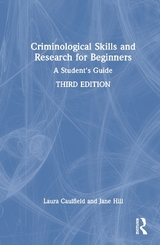
Criminological Skills and Research for Beginners
Routledge (Verlag)
978-1-138-04143-1 (ISBN)
Criminological Skills and Research for Beginners is a comprehensive and engaging guide to research methods in Criminology, and the skills required for academic success. Written specifically for undergraduate students and novice researchers, this book has been designed as a lively and accessible guide to planning, conducting and reporting research in the subject. It emphasises practical skills required in studying Criminology, the importance of criminological research, and places related methodology firmly in the context of students’ broader study of the discipline, before moving on to provide a detailed guide to the actual processes of research.
It is common for Criminology undergraduates to feel intimidated at the prospect of conducting their own research, and these students typically struggle to see the relevance of research methods to their own studies. This book speaks directly to the needs of such students, and includes contemporary examples and case studies that bring a topic that is often thought of as dry to life, providing a thorough and accessible practical guide that students can return to at each stage of their research, all the way through to their dissertation.
This book covers:
an examination of the theoretical, political and ethical debates in criminological research;
a complete guide to planning criminological research, assisting student researchers in identifying their research questions, choosing their research methods and critiquing the available literature;
guidance on the practicalities and processes of collecting data;
a discussion of the process of analysing data and writing up research.
New to the second edition is a brand new section on research skills in Criminology, including detailed coverage of writing skills, referencing, dissertations and research reports, presentation skills and revision. The book also offers additional coverage of the politics of criminological research and the presentation of official crime statistics.
Including an extensive glossary and an integrated companion website with extra examples, exercises and videos to further develop students’ understanding, this book is essential reading for any undergraduate on a Criminological Research Methods or Research Skills course, or for anyone in need of practical guidance on any or all of the various stages involved in conducting thorough and effective criminological research.
Laura Caulfield is Professor and Chair of the Institute for Community Research and Development at the University of Wolverhampton, UK. Jane Hill was the Programme Director for the Criminology BA at Birmingham City University, UK, before her retirement in 2012.
Part I: Study Skills for Criminology Students 1. Writing Skills and Essay Writing 2. Referencing 3. Revision Skills and Examination Techniques 4. Presentation Skills Part II: The Importance of Criminological Research 5. The context of criminological research: power, knowledge, politics, and values 6. The significance of criminological research: understanding the philosophical roots of our claims to know about crime in society 7. The ethics of criminological research Part III: Getting Going with Criminological Research 8. Planning: Where do research ideas come from? How do we ‘fine tune’ them? 9. Critiquing the literature and the process of writing your formal review 10. Theories, methods, and their relationships to theories of knowledge 11. Preparing for the practical challenges of real-world crime research Part IV: Doing Criminological Research: Data Collection 12. Ethnographic approaches to research 13. Questionnaires and surveys 14. Using documentary and secondary data sources Part V: Doing Criminological Research: Analysis and writing-up 15. Analysing the data: Quantitative analysis 16. Analysing the data: Qualitative analysis 17. Analysing the data: Documents, texts, and other data 18. Writing-up criminological research.
| Erscheinungsdatum | 06.07.2018 |
|---|---|
| Zusatzinfo | 11 Tables, color; 18 Line drawings, color; 21 Halftones, black and white; 18 Illustrations, color; 21 Illustrations, black and white |
| Verlagsort | London |
| Sprache | englisch |
| Maße | 156 x 234 mm |
| Gewicht | 580 g |
| Themenwelt | Recht / Steuern ► Strafrecht ► Kriminologie |
| ISBN-10 | 1-138-04143-2 / 1138041432 |
| ISBN-13 | 978-1-138-04143-1 / 9781138041431 |
| Zustand | Neuware |
| Informationen gemäß Produktsicherheitsverordnung (GPSR) | |
| Haben Sie eine Frage zum Produkt? |
aus dem Bereich



